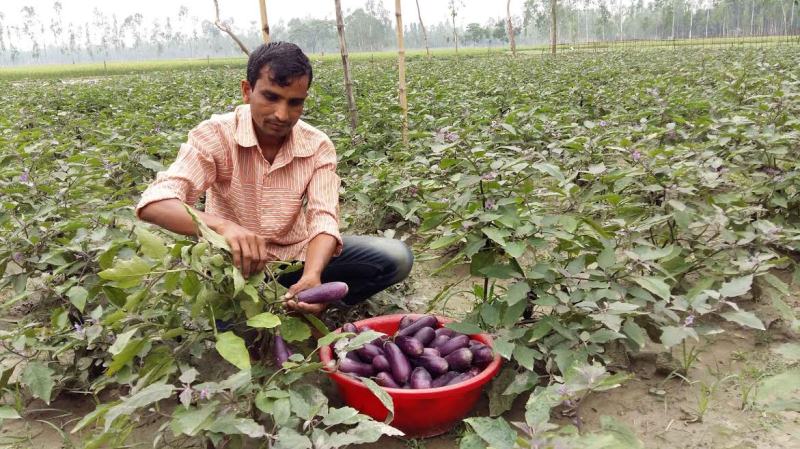
A Bangladesh newspaper is reporting the story of farmer Aminul Islam, who has successfully grown Bt brinjal (eggplant) without using pesticides.
Farmers growing brinjal, a staple vegetable crop in Bangladesh, typically must spray their fields every one to two days or 80-100 times during the growing season. But by using eggplant that is genetically engineered to resist the fruit and shoot borer pest, farmers like Aminul have been able to greatly reduce or eliminate their use of pesticides. They ve also been able to achieve a higher yield, and attract more customers.
As The Daily Manabzamin, a national newspaper in Bangladesh reported:
The demand of this brinjal is higher in the market as it s produced without pesticide and chemical fertilization. Aminul has already earned BDT 16000 (US$200) from his produce. He said that demand of the brinjal is higher during Ramandan and he is getting more profit now.
Alliance for Science Global Leadership Fellow Md. Arif Hossain, a communications specialist in Bangladesh, spoke to Aminul after the article was published and learned that he has been cultivating conventional brinjal for 10 years and Bt brinjal for the past two years.
As Hossain reported: He is happy cultivating Bt brinjal for low production cost, higher yield and better harvest.
Hossain further reports:
Aminul received 100-150 grams of BARI Bt brinjal-2 seed and transplanted the seedlings in the last week of December 2016. He spent BDT 3400 (US $42) on land preparation, weeding, irrigation and crop management for the half-acre field, and anticipates no additional expenditures for this season. Meanwhile, he has already earned BDT 16000 (US $200) selling about 400 kilograms of brinjal and expects to sell more fruit from his plot. He is interested in expanding his cultivation of Bt brinjal next season.
As The Daily Manabzamin reported:
Upazila Agriculture Officer Abu Sayeed Md. Fazle Elahi said that vegetable production is increasing in the upazila [region] for growing brinjal in the fallow lands. Farmers are producing vegetable crops without applying pesticide and chemical fertiliser. On the one hand, the farmers are benefited by cultivating this brinjal for its low production cost and on the other hand, consumers are getting pesticide free vegetables.
The Alliance for Science traveled to Bangladesh last year to meet with farmers growing Bt brinjal, and learned their experiences were similar to Aminul’s. The results of those interviews can be found in this video.
